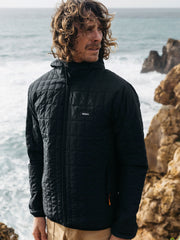Someone once said, ‘Only a surfer knows the feeling,’ … and they had a point. Transcendental, euphoric, meditative and the innermost limits of pure fun are all words or phrases that have been used to describe the essence of why surfers keep coming back to the water. I’m sure one thing on which all surfers would agree is that being in the water feels good. For some this may be down to the community they find there, for others it may be a personal connection with the energy of a wave or overcoming the challenge of riding their own personal big wave. My own personal journey into wave sliding involved some very negative experiences at school whereby surfing became my safe space, a place where negative thoughts, opinions and emotions could not touch me. It was my privilege later in life to be able to offer this same safe space to others in the form of the innovative surf therapy intervention; The Wave Project.
In September 2010, a group of 20 young people sat on the beach at Watergate Bay, Cornwall, for a surfing lesson. They had all been diagnosed with various mental health disorders, ranging from mild to severe. Some participants had been self-harming, others experienced severe anxiety, low mood or depression. One participant was diagnosed with schizophrenia. Yet to watch them on the beach, none of this was visible. It was the start of The Wave Project – the world’s first surf therapy course funded by a government health service and one which has since spread to 12 different sites across the whole of the United Kingdom reaching over 1,000 young people a year.
A key aspect of the Wave Project’s success has been the commitment to in-depth and rigorous evaluation of their service delivery. Over the course of the project’s life a number of evaluations have been carried out which demonstrate the effectiveness of their unique iteration of surf therapy. All of these are available on the Wave Project website and match other studies from around the world which highlight the effectiveness of surf therapy for individuals facing mental health challenges. One question that had not been academically investigated was how these positive effects occurred within surf therapy, not just within the Wave project, but on a global scale. There was and remains a large evidence gap into understanding the mediators for mental health improvements. Apparently only a surfer knows the feeling….

















































































